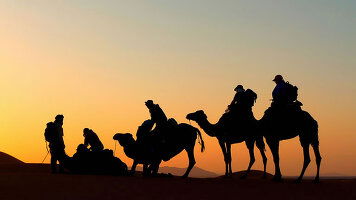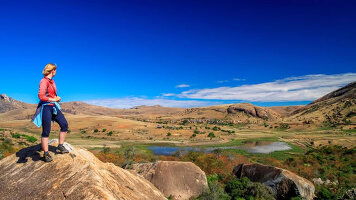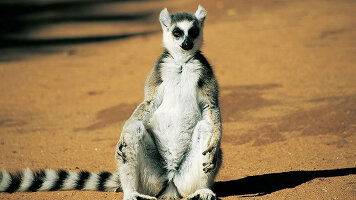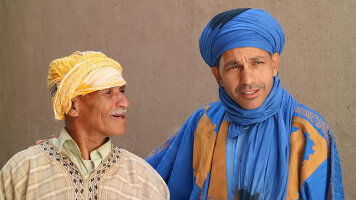Overview
Voodoo - Witness the intriguing and esoteric rituals of voodoo and see Benin during its festival season (select departures).
Diverse read more landscapes - Spend a night in a remarkable stilt village built on a lake at Ganvie and explore villages in the Atakora Mountains, accompanied by a fetish priest.
Village life - Get closer to traditional village life as we meet with a local chief, witness elaborate tribal dances and pass through bustling markets.
14 Days
Lome
Lome
Discovery
Comfortable
Affordable
16-99 Years
16
Full On
Fully Guided
BWA-1
Itinerary
Arrive in Lome, the lively capital of Togo.
For those arriving on time our tour leader plans to meet you in the hotel reception at 6pm for the welcome meeting and for those that wish, there is the chance to go out for dinner.
There are no other activities planned today, so you are free to arrive in Lome at any time. If you would like to receive a airport transfer today, you'll need to arrive into Gnassingbe Eyadema International Airport (LFW), which is about 15 minutes' drive from the airport. Should you miss the welcome meeting, your Leader will inform you of any essential information as soon as you catch up.
If you have free time on arrival then you may choose to walk through the bustling streets, relax or visit the Museum of the Arts 'Palais de Lome'. Dating back over 100 years, the building has been used as the French governors residence, the seat of Togolese presidency and also the residence of the Prime Minister before being abandoned. The 11 hectare park surrounding the palace is now home to a number of gardens and sculptures. We would suggest speaking to the hotel reception if you would like to visit so that they can assist with arranging a taxi. Stay: Onomo Hotel, Lome (or similar) (Comfortable)
Drive directly to the border on Benin this morning travelling past Agbodrafo, a small fishing town on the Gulf of Guinea. Once clear of the border formalities, we continue to the town of Ouidah, considered to be the spiritual home of voodoo. Once an infamous part of the old slave route, Ouidah was the site of one of the largest trading posts, supplying slaves to Europe and its outlying colonies. The echoes and ghosts of those infamous days still reverberate today, in its Afro-Portuguese architecture.
This afternoon visit the museum at the Old Portuguese Fort and take a walk along the slave route to the beach, where the unfortunate victims were loaded aboard the slave ships. We will also visit the remarkable Python Temple, where Ouidah's ancient snake cult is still very much in evidence. Snakes are still an important feature of many voodoo rituals, believed to be able to imbue vitality and protection.
We overnight in Grand Popo on the coast. Stay: Hotel La Casa Cielo (or similar) (Comfortable) (B)
Arguably West Africa's most colourful and vibrant celebration, on the 10th January each year hundreds of people including Chiefs and fetish Priests travel to Ouidah to be part of the dozens of ceremonies taking place during this national day of celebration; the Benin voodoo festival.
Most of the festivities take place in the morning, we will be able to watch an lively long procession of people, motorbikes and traditional 'taxi-brousse' making their way down to the Door of No Return, a memorial arch commemorating those enslaved Africans who left from Ouidah's shoreline. The many Beninese are joined by voodoo worshipers from around the world commonly including Haiti, New Orleans and Brazil, many wearing jaw-dropping traditional costumes and dress. The festival reaches its peak with the arrival of the Dagbo Houno, the chief Voodoo priest, who can be seen to slaughter a goat in honour of the spirits, a sacrifice that is followed by masked dancing, singing, speeches and the continuous beat of the drums. After the formal ceremony comes to an end the crowds disperse and more informal celebrations continue in courtyard and streets where the local inhabitants sell food and drinks.
Return to Grand Popo overnight. Stay: Hotel La Casa Cielo (or similar) (Comfortable) (B)
After the crowds and ceremonies of the voodoo festival the day before, today is more sedate as we drive two hours to Ganvie, the largest stilt village in Africa. Settled by the Tofinou people, fleeing the slave traders of the 16th century, the village today is an atmospheric setting of thatched huts, balanced on stilts of teak, where daily life is still very much conducted on the waters of the lake.
Fishing is still the principal activity for the inhabitants and every day the men go about their business, whilst women deliver their goods to the floating market and children go to school and play from the backs of open pirogues. But even amidst this tranquil aquatic idyll voodoo plays its part; after a relaxing afternoon we'll meet a local Bokono oracle, a village soothsayer, this evening. We'll learn how these traditional people are guided through life by the drums and dancing of voodoos haunting rhythm.
Tonight we stay in a very basic stilt house which we get to by sailing accross the lake. Its the most basic accommodation of the trip, with no air conditioning and only limited running water; the experience provides a great insight into how the community of Ganvie live their daily lives. Stay: Auberge Carrefour Ganvie Chez M (or similar) (Simple) (B/L)
Take a dugout canoe to the road head at Calaviu then drive three hours to the town of Abomey.
The Royal Palace has been undergoing refurbishment for some time and there is no notice of any reopening date, however, there is still plenty to see. Abomey was the capital of the Kingdom of Dahomey from the 17th to 19th centuries, well known for its skilled blacksmiths. We will take a tour of the town, seeking permission to visit one of the traditional workshops to learn more about their skills and hear about the history of this once-powerful capital. We will still be able to see the Royal Palaces of Abomey from the outside and if some of the artefacts from the museum are on display at another location, we will do our best to try and view them.
The Palace's outside walls are still decorated with bas-reliefs representing the symbols of the Dahomey kings and its halls and rooms hold the thrones and altars, statues and arms of a kingdom that lived in a perpetual state of war and built its greatness on the slavery of its neighbours.
Our hotel for the next two nights does not offer twin bed configuration rooms, we will therefore offer only a double or single bedded room. If you are a solo traveller booking on a twin-share basis (sharing with someone of the same gender) you will be allocated a single room. Stay: Bis Hotel (or similar) (Comfortable) (B/L)
This morning we visit the Chameleon temple in Abomey and a church, which for many is an unexpected highlight of the trip. Next, we head out to witness an Egun mask performance in nearby Cove. According to the local tradition, people perform the rituals not only to represent but also to embody the spirits of their ancestors. Dressed in bright, colourful costumes, they emerge from the forest and form a procession through the village streets. We'll have lunch in Cove.
This afternoon we also have the opportunity to visit a Gelede mask ceremony back in Abomey. A cult to the great divinity Oudua, the earth mother, Gelede is a cult, a secret society and a type of mask all at the same time. The brightly coloured masks represent the bridge between the society and the ordinary villagers and are comprised of a head with large eyes and sensual lips over which are an animated collection of characters and objects that tell stories, to the accompaniment of a choir and an excited audience.
This is a really special day as we encounter contrasting ceremonies, both very different and yet equally memorable, please note that the exact timings of the day may be amended and some flexibility is required, we may see the second mask ceremony on the late afternoon of day 5. Stay: Bis Hotel (or similar) (Comfortable) (B/L)
Its around three hours north to the town of Dassa the capital of an ancient kingdom settled around 1385. On arrival we visit the Sacred Hill where funerals for the royal family take place accompanied by Voodoo practices. The town is full of history, our tour leader will share the story of the infamous wooden horse which dates back from the middle ages and is still preserved to this day. Stay: Hotel Jeko (or similar) (Comfortable) (B/L)
Today is a long travelling day, with several stops en route. Departing early, we continue north making a stop at a Dankoli fetish, an important place of the Voodoo cult where thousands of little sticks are pushed in the fetish as witnesses of the countless prayers made to the local god to satisfy their everyday needs, a good harvest, a happy wedding, an easy delivery, a success at school. Once their prayers are answered, they come back to sacrifice what they promised to the fetis, this could be a goat, a chicken or a cow, according to the nature of the prayer. Traces of blood, palm alcohol and palm oil on the fetish prove that a lot of pilgrims had their prayers answered.
Please note you may witness the slaughtering of animals as part of your visit to the Dankoli shrines, if you feel uncomfortable about this speak to your tour leader to make alternative arrangements.
Just before we get to Natittingou we'll visit a Fulani settlement. The Fulani are mainly shepherds, the men move around with their herds while the women take care of the camp and milk the cows to produce butter to be sold at the local market. The Fulani are famous for their beauty. Fulani means beauty in the local dialect. Beautiful tattoos on their face send messages to the people who understand the language. We will make a stop at the settlement and learn about their customs.
Our simple hotel in Natittingou does not offer twin bedrooms, we will therefore offer only a double or single bedded room. If you are a solo traveller booking on a twin-share basis (sharing with someone of the same gender) you will be allocated a single room for this night. It does however have a pleasant terrace, a good spot for breakfast. Stay: Totora Hotel (or similar) (Comfortable) (B/L)
Another early start this morning to begin our journey back into Togo via Ketao. Our destination is the town of Kara. Along the way we make a stop at a village called Taneka. The village is made up of round houses covered with a conical roof protected at the top by a terra cotta pot. The upper part of the village is inhabited by the young, accompanied by fetish priests, who only cover themselves with goat skin and always carry a long pipe. This ethnic group has been living on an archaeological site inhabited since the ninth century. Since then, other populations have moved in, and the result is a melting pot of tribes and cultures, where each group has kept its own cults and initiation rites, overlaid by a common religious and political institution.
As we wander around the village, we might come across village elders. The Taneka people believe that to become a man, it's necessary to combine time, patience and a lot of blood from sacrificed animals. It's a lifetime process, almost a rite of passage for men of the village.
Our walk can last between two and three hours, along mainly flat alleys some of which are narrow and have rocky uneven steps.
We'll arrive in Kara in the early evening. Our hotel tonight is an old government building and we stay in the bungalows in the gardens. The hotel features a swimming pool and has a good restaurant - you can find several dining options in Kara as well. Stay: Hotel Kara (or similar) (Comfortable) (B/L)
This morning, we'll continue our journey north, entering a more mountainous arid region. Leaving the main road, we enter the land of the proud Tamberma people who live in fortified dwellings. Similar to medieval castles, they're one of the most beautiful examples of ancient African architecture, built by hand, layer by layer, by placing round balls of mud and shaping them according to the design and flair of the owner.
The Tamberma people hold strong traditional beliefs, evidenced through the presence of large shrines in phallic form, displayed at the entrance of their homes. Subject to permission, we'll enter their homes to gain an insight into their way of life. Houses are a projection of their anthropological and cosmological beliefs. The first floor - enveloped in darkness - represents death, it's the place of the ancestors. The second floor - open to the sky - represents life. As well as a home, the house is a place of refuge. All of the family, food and animals are kept within the house for survival in case of attack. For centuries, these populations have been seeking refuge in the hard-to-access Atakora mountain to escape from the slave trade.
A word of caution about handing out gifts or money in the rural communities we visit, please refrain from doing this. We pay a fee to the local community for our visit, which is distributed appropriately by the village elders. Giving additional gifts can cause conflict, as village traditions are strongly based on fairness. Should you wish to give a gift please speak to your tour leader about the best way of doing this.
After a picnic lunch, we drive back to Kara, through a mountainous region where the Kabye people reside. The Kabye are excellent blacksmiths who still work with traditional methods that have been lost in the Western world. Stay: Hotel Kara (or similar) (Comfortable) (B/L)
Today we travel towards Sokode with stops along the way to meet the Bassar people. The Bassar live in traditional large clay houses with conical roofs and produce iron following an old traditional procedure. Strict rules have to be followed: only old women should provide the coal needed, which they collect from the mountains surrounding the villages. According to their belief, the iron would only melt under particular circumstances and if a strict code of conduct is observed.
Our tour leader will also see if it's possible to meet a traditional Chief who will talk to us about their role in the society and leading their village, it is traditional for the chief to welcome new guest to the village and give a blessing however it should be noted this is not a touristic activity and the chief may not be available on the day of our visit.
In the evening, we'll witness a traditional Fire Dance. Dancing to the hypnotic beat of the drum, the dancers eventually leap into the glowing embers. They then pick up burning coals and pass them over their body and mouth without showing any pain or injury. Whether it's a matter of courage or magic, witnessing these rituals is a real privilege and a truly interesting experience.
Our hotel tonight does not offer twin-bed configuration rooms, we therefore only offer a double or single room. If you're a solo traveller booking on a twin-share basis (sharing with someone of the same gender), you'll be allocated a single room. Stay: Hotel La Mirell (or similar) (Comfortable) (B/L)
This morning , we drive south to Kpalime (a journey of around five hours) Togo's fourth largest city which is surrounded by tropical forest. As we travel, we'll stop to visit local villages, experiencing the smells and sounds of the colourful markets; one such market is found at Atakpame, a crossroads town and our lunch stop. The settlement has a lively market where we can usually stumble on elaborate weaving demonstrations.
This area is Togo's biggest producer of artisanal items including pottery, woven items and wood sculptures. We'll visit the Centre of Artisans to see their work. Stay: Hotel Parc Residence (or similar) (Comfortable) (B)
We'll set off after breakfast for a guided hike through the countryside. Following well-marked tracks, we'll hike for around two hours guided by a butterfly expert. Along the trails, we'll learn about the ecosystem in the surrounding adjacent forest. The walk is mainly on flat terrain but it will be humid and warm, so insect repellent and sun protection are recommended.
The last leg of our journey sees us return to Lome, the capital city of Togo for a guided tour. Once an important landmark within West Africa's notorious slave trade, Togo was colonised in the 15th century and this can still be seen today in the faded European architecture and tree-lined boulevards. We'll visit the colourful market and Togo's famed fetish market where locals and voodoo priests alike can source anything from good luck charms to animal skulls to aid their pursuit of bringing themselves good fortune and health. Time permitting we will also make a stop at one of Lome's craft markets and its imposing gothic cathedral building. Stay: Onomo Hotel, Lome (or similar) (Comfortable) (B)
The trip ends after breakfast at our hotel in Lome.
There are no activities planned today, so you are free to depart from Lome at any time. If your flight is departing early in the morning, breakfast will be served very early. If your flight is departing later in the day, luggage storage facilities are available at our hotel. There may be the option to pay for a day room at €30, which is subject to availability at the hotel.
If you would like an airport transfer today, you need to depart from Lome Tokoim International Airport (LFW), which is about 15 minutes' drive from the airport. (B)
Trip Inclusions
- Discover tribal lands, proud cultures and striking landscapes through Togo and Benin
- Travel through this culturally diverse region and encounter the spiritual home of voodoo
- Witness a fire dancing ceremony and meet the Somba people in the Atakora mountains
- Full on paced trips are for travellers who like their holidays packed with activities and experiences, moving on quickly from place to place with lots of early starts and long, busy days. Some may find them tiring, but others get a buzz from packing their precious holiday-time as chock-a - block full of new experiences as possible.
- Accommodation, itinerary and inclusions subject to change.
- Price is for land, cruise and internal flights as specified. Flights not specified are not included
Operator
Our small groups are typically 12 people – small enough to get right into the heart of your destination, but big enough to find like-minded people to share your experiences with. And the glue that holds these groups together is our local tour leaders, who are uniquely placed to add individual and spontaneous moments to each trips – moments that stay with you long after you return home. All sorts of people travel with Explore – our groups are usually a mix of solos, couples and friends. What unites them is their adventurous spirit and thirst for real travel experiences.
We provide authentic small-group travel, designed by experts and led by experts, with sustainability at its heart and a common desire for unforgettable experiences. Whether you’re on a cultural tour of Lebanon, cycling in Vietnam, walking in Italy or exploring Costa Rica with your family, when you’re travelling with Explore you know that you’re in good hands.
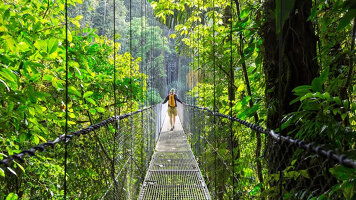
Launching in 1981, Explore Worldwide offer trips from over 130 countries - from classic small group tours. Read more
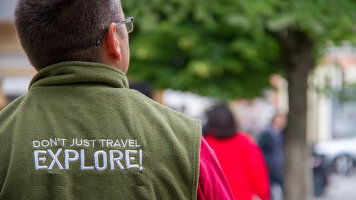
Explore's leaders are more than just your typical guide. They're your local expert are are passionate about sharing their expertise with you. Read more
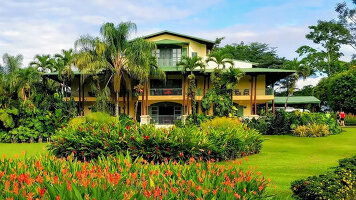
The places Explore stay are every bit as important as the sights they visit and the things you do. Read more
Download Brochure

Explore Worldwide Small Group Adventures (2025-26)
Dates & Pricing
 USD
USD
A definite departure means minimum numbers have been reached for this departure to operate. Your Global Journeys Travel Advisor will check the availability of your departure date when you Inquire. Additional savings may apply. T&C’s apply.
Tour & cruises prices are per person. Prices shown have savings applied, are subject to availability and may be withdrawn at any time without notice. Pricing and trip details are correct at this point in time, however are subject to confirmation at the time of booking and are subject to change by Explore. For cruise itineraries, cabin images are sourced from the cruise-line and should be treated as indicative only. Cabin inclusions, upholsteries and room layout may differ to the image(s) shown depending on the ship selected and your sailing dates.





